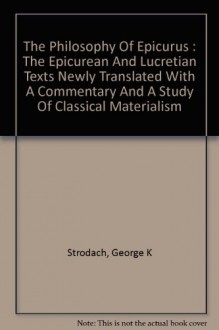THE PHILOSOPHY OF EPICURUS: Letters, Doctrines and Parallel Passages from Lucretius.
In 306 BC, Epicurus established his school at Athens in his garden, from which it came to be known as The Garden. In popular parlance, Epicureanism means devotion to pleasure, comfort, and high living, with a certain nicety of style. The basic concepts are the identification of good with pleasure...
show more
In 306 BC, Epicurus established his school at Athens in his garden, from which it came to be known as The Garden. In popular parlance, Epicureanism means devotion to pleasure, comfort, and high living, with a certain nicety of style. The basic concepts are the identification of good with pleasure and of the supreme good and ultimate end with the absence of pain from the body and the soul, a limit beyond which pleasure does not grow but changes; the reduction of every human relation to the principle of utility, which finds its highest expression in friendship, in which it is at the same time surmounted; and, in accordance with this end, the limitation of all desire and the practice of the virtues, from which pleasure is inseparable, and a withdrawn and quiet life. In principle, Epicurus' ethic of pleasure is the exact opposite of the Stoic's ethic of duty. The consequences, however, are the same: in the end, the Epicurean is forced to live with the same temperance and justice as the Stoic.
show less
Format: hardcover
ASIN: B000IT2XNK
Publish date: 1963
Publisher: Northwestern University Press
Edition language: English

